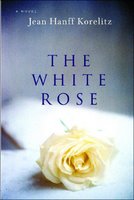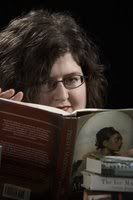 In a complete departure from her previous novels, Jean Hanff Korelitz’s third novel is a modern retelling of Richard Strauss’s comic opera Der Rosenkavalier (The Knight of the Rose). Set in Manhattan and the Hamptons, The White Rose is the story of Marian Kahn, a professor and discoverer of the eighteenth-century adventuress, Lady Charlotte Wilcox, and Marian’s much younger lover Oliver, son of her oldest friend. Married for many years, and comfortably settled in her relationship, Marian is stunned to discover the passion that explodes when she meets a grown-up Oliver. Their relationship is a source of joy and misery for Marian, one that is made more difficult by the arrival of Marian’s cousin Barton, in town to announce his engagement to Sophie, a young graduate student in Marion’s department. As the lives of the four become increasingly entwined, Korelitz has many opportunities to meditate on love and its relationship to time.
In a complete departure from her previous novels, Jean Hanff Korelitz’s third novel is a modern retelling of Richard Strauss’s comic opera Der Rosenkavalier (The Knight of the Rose). Set in Manhattan and the Hamptons, The White Rose is the story of Marian Kahn, a professor and discoverer of the eighteenth-century adventuress, Lady Charlotte Wilcox, and Marian’s much younger lover Oliver, son of her oldest friend. Married for many years, and comfortably settled in her relationship, Marian is stunned to discover the passion that explodes when she meets a grown-up Oliver. Their relationship is a source of joy and misery for Marian, one that is made more difficult by the arrival of Marian’s cousin Barton, in town to announce his engagement to Sophie, a young graduate student in Marion’s department. As the lives of the four become increasingly entwined, Korelitz has many opportunities to meditate on love and its relationship to time.Compared by many reviewers to Edith Wharton, Korelitz has a keen eye for the vagaries of the privileged classes. Reexamining New York Society’s views on adultery, social climbing, wealth and status, Korelitz presents the old money position through the characters of Marian and Caroline, Oliver’s mother, and the cutting views of gossip columnist Valerie Annis. The satire on this position is represented by Marian’s cousin Barton and contrary views are portrayed through Oliver, with much of the commentary coming in the voice of the adventuress Lady Charlotte.
One of the central points explored in The White Rose is whether happiness can come from wealth or status. Marian suggests that if people followed the example set by Lady Charlotte, they’d be happier.
“If she [Lady Charlotte] had gotten too attached to the idea of happiness coming from wealth or status, she would have spent most of her life feeling that she’s lost her chance to be happy, but she never linked those ideas together.”
Marian seems to be questioning herself in this passage, raising the question of why she can’t be free like Lady Charlotte and be happy with Oliver, overturning the status quo and walking away from society’s expectations of her. The characters in The White Rose fall out on two sides of this entrenched debate, lined up in the camps that fit with their place in New York Society’s hierarchy. Caught up in Society’s expectations, Marian seems unable to stir from the torpor induced by her wealth and position. Her minor rebellions from this set role – her affair with Oliver, publishing her work on Lady Charlotte and her relationship with Soriah, a fan of her book - still are not enough to enable her to follow the lead set by the adventuress.
Despite Marian’s mundane existence, she seems to exist in a world apart, her own “Aubergine Time”:
“There is a time in each day that is neither afternoon nor evening but something breathless in suspension between them when every particle of air is briefly infused with fierce, fierce color, one instant so utterly there, than gone.”
The White Rose provides a window into this time in Marian’s life, that moment when she is poised to choose between what is comfortable and a chance at happiness. Marian’s story causes us all to question what we would do when faced with our own “Aubergine Time.”
Jean Hanff Korelitz is the author of a book of poems, The Properties of Breath, and two previous legal thrillers, A Jury Of Her Peers and The Sabbathday River. She lives in Princeton, New Jersey with her husband, the Pulitzer Prize-winning Irish poet Paul Muldoon, and their children.
See the review as it is posted at Curled Up with a Good Book: The White Rose.


No comments:
Post a Comment